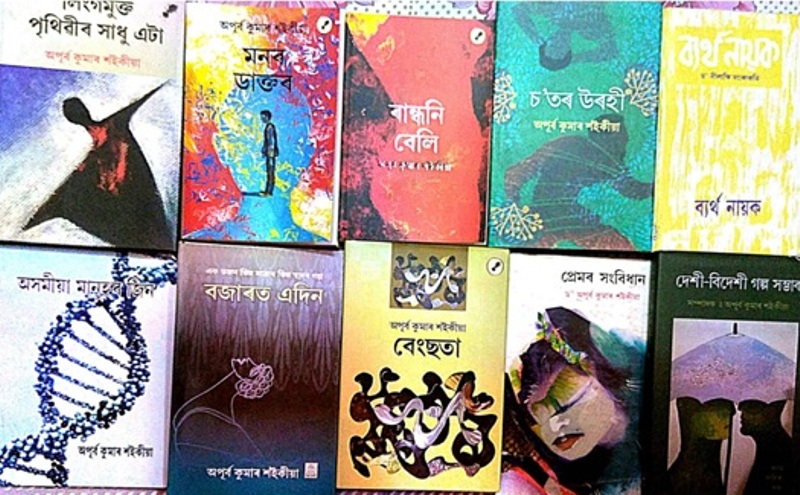Assam | Apurba Kumar Saikia: Bridging medicine and literature - An insightful interview
Apurba Kumar Saikia, 62, is a celebrated Assamese short story writer. Apart from being an eye specialist by profession, he ardently weaves intricate narratives that have garnered him both critical acclaim and the prestigious Sahitya Akademi Award. Saikia's literary prowess is characterized by profound storytelling, infused with subtle wit and a profound understanding of human nature. With nine short story collections to his credit, including "Bengsata," "Byortho Nayak," "Lingamukto Prithivir Xadhu Eta," "Chotor Urohi," and "Bojarot Edin," Saikia's literary contributions have left an indelible mark on Assamese literature. In this interview with Subhajit Bhadra, Sakia reflects on his literary journey, exploring his inspirations, creative process, and the themes that resonate within his work.
Can you tell us about your literary journey? How did you develop your love for writing?
My love for words began in my early school days. Growing up in a village near Nagaon, I was surrounded by books thanks to my father, an avid reader who received awards for his library visits. Even before I could write, books were a constant presence in my life. By sixth grade at Nowgong Government Boys' Higher Secondary School, a story – "Jivanar Mamata Kot" – flowed effortlessly from me. Short stories weren't unfamiliar; I had already devoured the works of Dr Bhabendra Nath Saikia, Mahim Borah, and Saurav Chaliha. Unlike many writers who start with poetry, fiction was my calling, and it remains my enduring love.
You're an eye specialist by profession, yet your fiction reveals a keen eye for human behaviour. How does your medical background influence your writing?
They say eyes are windows to the soul, and as an eye specialist, I have the privilege of witnessing a tiny part of the brain through them. This, coupled with my fascination for the human mind – its complexities, seemingly illogical actions, and psychosomatic or somatopsychic manifestations – fuels my creativity. It's a vast and captivating landscape! A memorable incident involved a young married woman with vermilion who stained my equipment. The next patient, Julekha, a Muslim woman, received some vermilion on her forehead during the examination. When I asked her to wipe it off, she refused. This simple incident sparked a whirlwind of questions and possibilities, eventually evolving into the heartwarming story "Sendoor."

Why have you chosen to focus on short stories? Do you have plans to write novels?
Perhaps I'm a bit lazy, or maybe short stories simply bring me more joy. I have countless plots, subplots, and ideas that could potentially become novels with effort, but it never quite happens. Three novels are in various stages of development – germination, vegetation, budding – but haven't blossomed yet. Hopefully, this year will see the completion of at least one.
Your stories effortlessly blend humour and seriousness. How do you navigate this duality?
The juxtaposition of humour and seriousness reflects the essence of human life. While tackling a protagonist's predicament, I sometimes use humour as a form of comic relief. Similarly, I might introduce "tragic relief" in an overly humorous situation. I believe human emotions at a specific time and place are multifaceted and multidirectional. My characters, reflecting the complexities of human behaviour, sometimes act chaotically or unreasonably, yet within the boundaries of normalcy. They are portrayed as observers of two worlds, acknowledging the messy nature of human actions in challenging moments.
Your stories often incorporate mild satire and paradox. Is this a deliberate aesthetic choice?
Satire and paradox are woven into the fabric of my stories, often unintentionally. I write with a dream reader in mind, and these characters occasionally influence my writing. Unlike Jorge Luis Borges, who believed in writing for himself, I prioritize reader engagement.
A story, besides possessing all the necessary elements of the genre, must first be readable. If not, it fails as a vehicle of literary pleasure from writer to reader. My primary focus is to create an enjoyable reading experience; the heavier literary aspects come later.
Winning the Sahitya Akademi Award is a remarkable achievement. How do you plan to continue contributing to Assamese literature in the future?
Balancing the vast worlds of medicine and literature has always been a juggling act. Literature has often been a costly passion. Receiving the Sahitya Akademi Award has significantly increased my responsibility as a writer. Meeting the expectations of well-informed readers is no small feat. Fame, as they say, is like riding an untamed tiger – you can only move forward.
Earlier, I mentioned my lack of exceptional intelligence! Nonetheless, I have dreams and plans with deadlines I aim to achieve. I hope you won't mind if I keep these goals a secret for now.